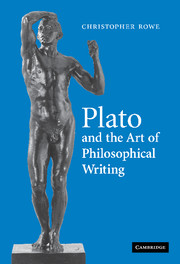Book contents
- Frontmatter
- Contents
- Preface
- Preliminaries: reading Plato
- THE DIALOGUES
- Introduction: The simile of the cave in the Republic
- 1 The Apology: Socrates' defence, Plato's manifesto
- 2 The Phaedo: Socrates' defence continued
- 3 ‘Examining myself and others’, I: knowledge and soul in Charmides, First Alcibiades, Meno, Republic, Euthyphro, Phaedrus
- 4 The moral psychology of the Gorgias
- 5 ‘Examining myself and others’, II: soul, the excellences and the ‘longer road’ in the Republic
- Appendix to Chapter 5: Socrates vs Thrasymachus in Republic I
- Interlude: A schedule of the genuine dialogues
- 6 Knowledge and the philosopher-rulers of the Republic, I: knowledge and belief in Book v
- 7 Knowledge and the philosopher-rulers of the Republic, II: the limits of knowledge
- 8 The Theaetetus, and the preferred Socratic–Platonic account of knowledge
- 9 The form of the good and the good: the Republic in conversation with other (‘pre-Republic’) dialogues
- 10 Republic and Timaeus: the status of Timaeus' account of the physical universe
- 11 Plato on the art of writing and speaking (logoi): the Phaedrus
- Epilogue: What is Platonism?
- Bibliography
- Index
4 - The moral psychology of the Gorgias
Published online by Cambridge University Press: 22 September 2009
- Frontmatter
- Contents
- Preface
- Preliminaries: reading Plato
- THE DIALOGUES
- Introduction: The simile of the cave in the Republic
- 1 The Apology: Socrates' defence, Plato's manifesto
- 2 The Phaedo: Socrates' defence continued
- 3 ‘Examining myself and others’, I: knowledge and soul in Charmides, First Alcibiades, Meno, Republic, Euthyphro, Phaedrus
- 4 The moral psychology of the Gorgias
- 5 ‘Examining myself and others’, II: soul, the excellences and the ‘longer road’ in the Republic
- Appendix to Chapter 5: Socrates vs Thrasymachus in Republic I
- Interlude: A schedule of the genuine dialogues
- 6 Knowledge and the philosopher-rulers of the Republic, I: knowledge and belief in Book v
- 7 Knowledge and the philosopher-rulers of the Republic, II: the limits of knowledge
- 8 The Theaetetus, and the preferred Socratic–Platonic account of knowledge
- 9 The form of the good and the good: the Republic in conversation with other (‘pre-Republic’) dialogues
- 10 Republic and Timaeus: the status of Timaeus' account of the physical universe
- 11 Plato on the art of writing and speaking (logoi): the Phaedrus
- Epilogue: What is Platonism?
- Bibliography
- Index
Summary
In this chapter, postponing what will essentially be an extended treatment of the Republic in chapters 5–9, I discuss three problems in another pre-Republic dialogue, Gorgias. Each of these problems turns out – I claim – to be resolvable in terms of Plato's writing strategies; the outcome will be a further case study on that topic, but one which at the same time reinforces my so far relatively sketchy account of the positions from which Plato's Socrates starts – and starts, I claim, as much in the Republic as in the dialogues that precede it.
PROBLEMS
The Gorgias, from most points of view, looks anomalous. For on the one hand the dialogue contains one of the most spectacular applications of the Socratic theory of action, in the shape of Socrates' claim that orators and tyrants have no power – a claim from which he not only never retreats, in the rest of the dialogue, but on which he seems to build even more surprising, paradoxical, even (apparently) comical claims. Those supposedly enviable people, who – so Gorgias has claimed – can do whatever they want, in fact – Socrates says – do nothing they want, only what seems best to them. ‘How ridiculous!’ responds Polus. But of course Socrates is perfectly serious: they don't do what they want.
- Type
- Chapter
- Information
- Plato and the Art of Philosophical Writing , pp. 143 - 163Publisher: Cambridge University PressPrint publication year: 2007



